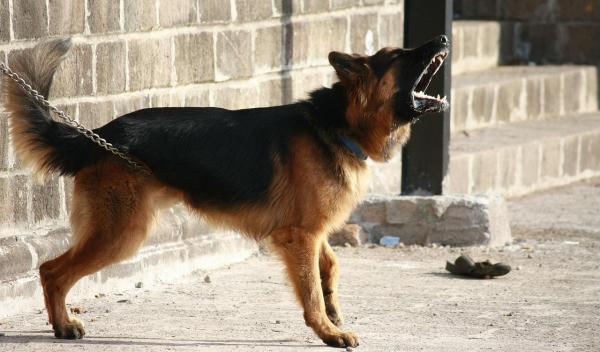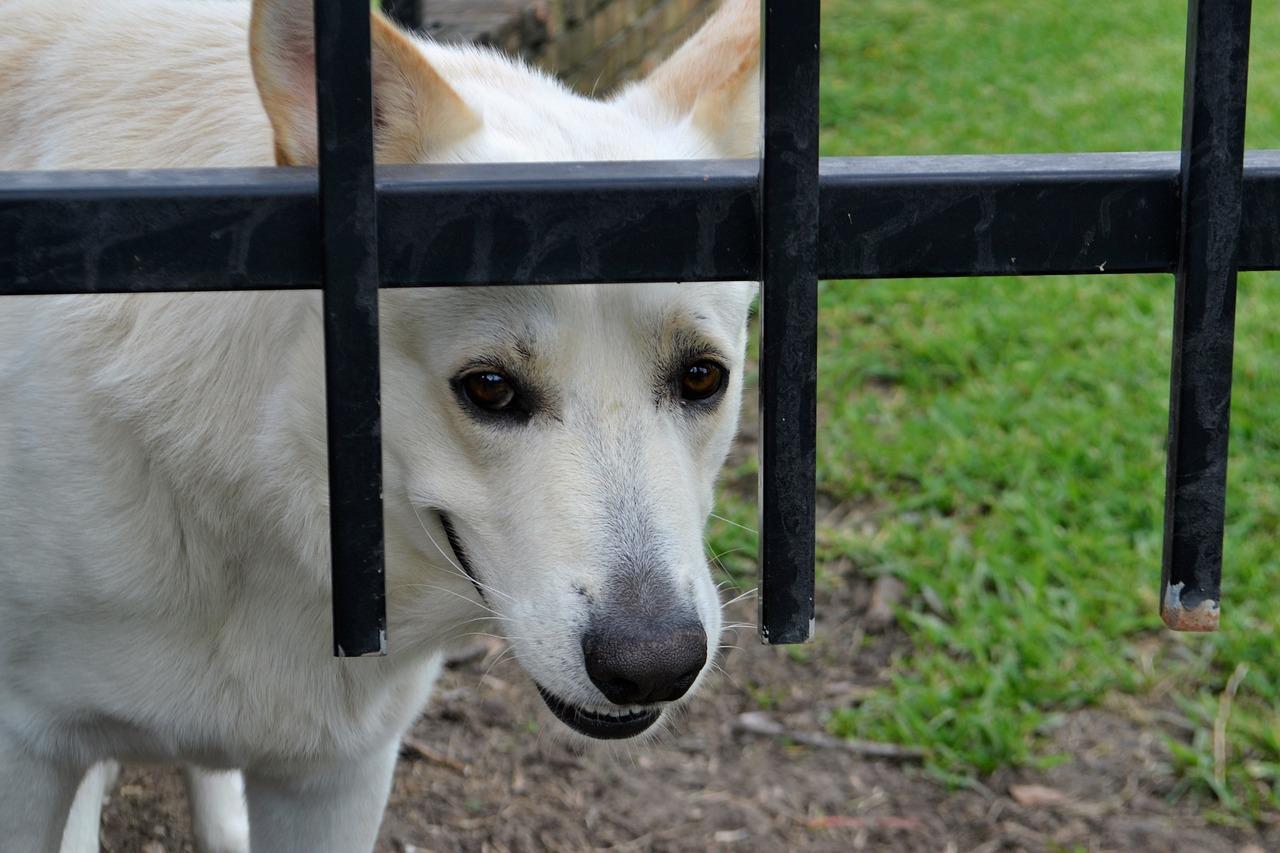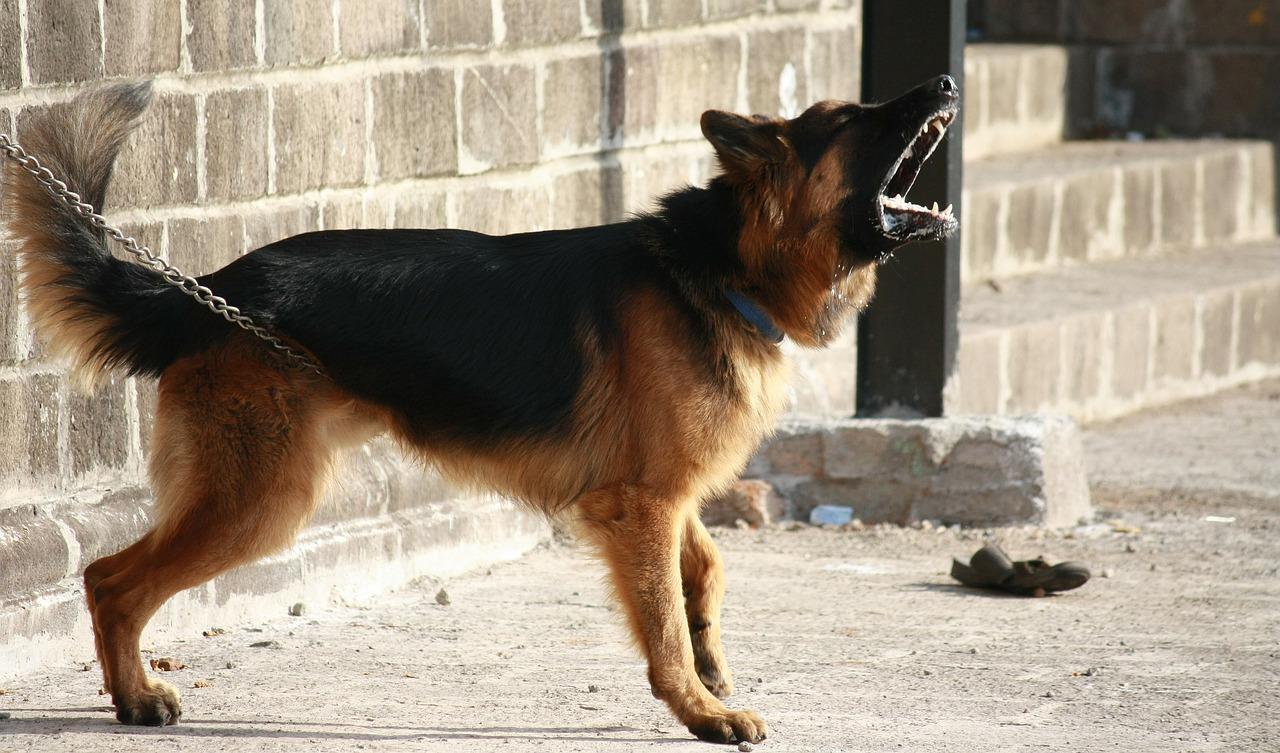Why Does My Dog Bark at Some Strangers and Not Others?



See files for Dogs
If you share your life with a dog, you will notice that they have some particular personality traits or characteristics. Some of them may be typical to their breed, others may be completely idiosyncratic. How they relate to people outside of their family will also vary depending on the individual dog. May guardians have noticed that their canine friend may be completely subdued with some people they meet, yet bark or howl at others. There may not seem to be any particular rhyme nor reason to this selective disliking of people. For this reason, AnimalWised poses the question why does my dog bark at some strangers and not others? By Answering this question, we will be able to discover how dogs relate to people and what is is they are trying to communicate with both vicalizations and body language.
- Why do dogs bark?
- Why does my dog bark at some people and not others?
- Do dogs bark out of fear?
- Is it true that dogs can smell people's fear?
- Do dogs bark at certain people to get their attention?
- Do dogs bark at people to defend their territory?
- Do dogs bark at people due to bad education?
- Do dogs bark after being traumatized?
Why do dogs bark?
To understand why your dog barks at some strangers, but not others, we need to understand why dogs bark in the first place. Canines mostly use their body language to express their moods, emotions and perceptions about their environment. The signs they demonstrate are not always picked up on by us humans. More noticeable are vocalizations such as growling, howling, whimpering or barking. While not employed as much, these vocalizations are a very important part of how these animals interact with their environment.
In their day-to-day lives, dogs bark to communicate different emotions and experiences. These emotions and responses to experiences will differ according to the various stimuli and occurrences in their environment. This stimuli refers not only to the noise, visuals or smells they come across, but also to the presence of others in this environment, whether other dogs, other animals or people. This is why there are so many different possible meanings behind each bark as every situation is unique.
To best identify the meaning behind each bark, we must pay attention to the dog's posture, facial expression and movements. When a dog is stressed, they will show other signs of stress other than barking. These may include nervousness, excessive salivation, excessive panting, hiding, adopting a defensive stance and many others. An angry dog which is adopting an offensive position will also belie their intentions through body language. These signs can include bearing their teeth, scratching the ground, snorting, having dilated pupils and holding a remarkably rigid stance.
Witnessing the above signs in your dog means you should take a step back and stay calm to help diffuse the situation. They will need to calm down and return to their normal selves. Trying to push the situation, whether they are angry or defensive, may result in aggression. Once they have calmed down, you will need to identify the cause of these negative emotions and establish the right course of action.
Knowing the personality of your dog is incredibly important in dealing with these situations. You will only be able to identify uncharacteristic behavior if you are already aware of their characteristic behavior. There are likely some understandable instances where the dog will be aggravated. However, if you notice your dog's character has changed in general, we recommend taking them to the vet to verify their health status. There are various medical conditions why a dog's behavior can change, simply being in pain is a major cause. Ruling out any pathological cause of excessive barking is necessary before addressing behavioral issues.
Why does my dog bark at some people and not others?
Knowing that dogs bark for various reasons doesn't answer the question posed in the title. When our dog barks at someone who is aggressive, it is understandable they might react to the situation vocally. When a good friend comes up to say hi with a friendly disposition and barking ensues, we may have less of an idea. Similarly, why does a dog not react at all to some people, but will growl or bark at others?
There is no one single explanation for this behavior. To know why a dog is barking at someone, we need to know the context of the situation as well as possible. This may not even be possible with the limits of our perception. However, there are some general reasons to explain this behavior. The following sections help us to look at this context, analyze what might be going through their mind and understand what the person may represent to the dog.

Do dogs bark out of fear?
Fear is one of the main reasons why a dog may bark. In general, fearful behaviors towards people and other dogs is associated with poor socialization at a young age. While fear may be the reason why your dog barks at some people and not others, the root cause of this fear is often their experience or lack thereof as a puppy.
In dogs, fear is something which can start to manifest itself at the end of the socialization period as a puppy. This period should be a minimum of 8 weeks, with 12 weeks recommended by many. During this stage, we need to introduce the puppy to different people, other dogs and any animals which might likely enter their environment. By helping them to be comfortable in the face of various stimuli, we can best prevent fearful or insecure behavior throughout their lives. Although ideally this will be carried out while still young, it is possible to also socialize adult dogs. Patience, affection and positive reinforcement may be particularly necessary in older dogs.
When a dog which has not been properly socialized during their formative stages, they lack positive interactions with unknown persons or animals. The result is fear of the unknown as they have little reassurance that they will not be attacked or that the family they do know are not in danger. Even with people the dog has previously met, they may still act in a fearful or exaggerated way. This is commonly associated with traumatic experiences (something we'll discuss further below).
There are other reasons why a dog barks at people out of fear. Our article on why your dog is afraid of people will help highlight some of these other issues. Not only that, but it will provide you some helpful tips and practical therapies to implement. Hopefully these will assist your dog in rehabilitation and they will have much more positive interactions in the future. If a medical pathology is the underlying cause of fear, the treatment will have to be directed towards this.
Is it true that dogs can smell people's fear?
You may have heard it said that dogs can smell fear and may bark to identify this emotion in some people. There is debate in the veterinary medical community over the veracity of this claim. However, there are studies which do support the theory. One published in 2017 took human subjects and introduced them to their fearful or happy stimuli. Body odor samples were collected and then introduced to different dogs. The behavior of the dogs was then recorded and stressful behaviors were recorded more often in those which were subjected to odor of those given fearful stimuli[1]. While not conclusive, the study does imply canines can identify a person who is themselves afraid.
When we feel fear or any other extreme emotion (such as stress, anxiety or overexcitement), our body releases hormones into the blood stream and other bodily fluids. When these fluids are secreted in the form of sweat, the dog's incredible olfactory ability means they can pick up on the scent released concurrently. A person who is afraid of dogs will also adopt a defensive or apprehensive body position when in the presence of this animal. The dog’s heightened perception means they can sense this from the visual stimuli alone.
A person who is fearful may not intend to induce fear in the dog, but this is often the result. The dog will not understand that the person is merely fearful of dogs in general and will suspect something else is causing the exhibition of fear signals. The end result is often barking.

Do dogs bark at certain people to get their attention?
We may jump to conclusions when we see our dog barking at someone, interpreting the behavior as aggression or dislike. However, it has been widely reported that dogs will use barking as a means of attracting attention to their owners[2]. They do it because they simply want attention, want to play, go for a walk or meet any of their myriad wants and needs. Barking in this context doesn't necessarily mean it will be aggressive. In fact, many dogs will bark because they want to play and share a positive experience.
When a stranger approaches, the dog my even feel positively towards them. In these cases, the dog may bark out of excitement or a desire to play. Again, this is why looking at the body language of your dog is also so important. If the dog is wagging their tail, jumping in anticipation or displaying any of the signs they are happy, their barking will be an extension of this feeling.
As we have discussed, the context of the barking is important to know their impetus. If they seem happy and excited, their barking is going to reflect this. However, a study in 2004 suggests that the intensity and tone of the bark will remain constant dependent on the emotion elicited by the context[3]. This means dogs may have a greater understanding of the context of a given situation than many of us consider.
Do dogs bark at people to defend their territory?
Dogs are territorial animals and can be very protective of their home and family. Objects which the dog considers to be theirs may also need protected in their minds. The presence of people, dogs or any unknown animal in their home may lead the dog to feel like their territory is being invaded. They will feel a natural impetus to preserve them and protect against threat.
The protection of resources is also a natural behavior in dogs which stems from their wild ancestry. A relative lack of resources means a pack of dogs will need to defend their supplies from other animals and maybe even each other. When a stranger enters their home or even moves next to something they cherish, the dog may bark in retaliation of perceived threat. Such responses can result in aggressive attitudes which may be dangerous to themselves or others.
Possessive dogs need adequate treatment to control their negative reactions and relate positively to people. Positive reinforcement will help a dog to better understand that they can share without losing any of their requisite resources. A canine ethologist or qualified dog trainer may need to be employed to address this behavior.
While we may think it a human only personality trait, a study from 2014 asserts that canines can also experience jealousy[4]. The study entailed recording responses when their owners gave attention to what appeared to be other dogs. They found that the dog displayed certain behaviors to suggest the presence of jealousy. The claim is that jealousy may be a primordial behavioral trait, although it is likely to have been exacerbated by dog's history of domestication with humanity. It does not, however, claim that these forms of jealousy are as complex as human forms, nor that they have as sophisticated an ability to understand social cues.
When a person or stranger is seen to speak to their owner, a dog may bark as a display of the attention being taken away from them. A content dog is unlikely to feel this insecure when around others. Another important circumstance in which a dog may seem jealous is when a new family member is introduced to their living situation. Taking extra precautions when introducing a new family member to a dog is imperative and can help them to stop barking at inappropriate situations.

Do dogs bark at people due to bad education?
While we may think that we are acting lovingly to a dog, it is common for humans to unconsciously reinforce certain negative behaviors. For example, we may offer our dog a treat or pamper them in some other way to get them to stop barking or making noise. Unfortunately, our bribe may work conversely and make them think they are being rewarded for making such a racket. This can lead to continuation of this behavior due the perception that it is a good thing.
We need to share our dog's life with our own, so there will be many occasions when friends or family who live outside the home will be around them. In these instances, this type of unconscious training might be going on without you realizing it. Relatives, friends, neighbors or anyone else who regular interacts with your dog may think they are being nice, but are actually reinforcing bad behaviors. If your guests gives them lots of attention, feeds them treats or tries to calm them down when they bark, the dog might be barking for their attention. They have assimilated to a dynamic that when they sense their presence, they want to get their attention.
Do dogs bark after being traumatized?
Unfortunately, many dogs have been subjected to a range of physical and/or emotional abuse in their history. As we encourage people to consider adopting, they may find they have a dog enter their home which as such a traumatic past. The past trauma can have a seriously detrimental effect on the dog's ability to relate to other animals and people[5]. This can lead to generalized anxiety and aggression. We need to disassociated fear with these kinds of phobic anxiety. Fear is a natural response to environmental stimuli. It can help them to avoid dangerous situations and is fundamental for survival. Phobic anxiety is a disproportionate and exaggerated reaction to certain stimuli.
If your dog is afraid of certain people and not others, it could be due to something about said person which reminds them of their trauma. For some people, this could be a physical resemblance or something even more subtle such as a smell or way of gesturing. It can even happen that dogs will prefer a particular gender as a response to abuse they have suffered.
Unfortunately, knowing the exact cause of a stressed, fearful or aggressive reaction in a dog may not be possible. Instead, the dog will need training and encouragement to lead as high a quality of life as possible. A canine ethologist will be best to help encourage good behavior as well as controlled exposure to other people.
Providing a positive environment is also incredibly important in your dog's ability to relate to others. This positive environment also includes you and the other members of your household. While further research needs to be carried out to determine causal factors, there have been links established between an owner's psychological status and behavioral problems in their dogs[6]. This means that a dog may reflect their owner's attitude when it comes to addressing strangers. If you hold your body or display signs of anxiety when meeting other people, it is possible your dog may be reflecting this approach by barking at them.
Whatever the behavioral problem, it is important to take your dog to a specialist if they are barking unnecessarily at strangers or even people they know. A vet should first be contacted to determine underlying health problems and a behaviorist contact if the problem is emotional.

If you want to read similar articles to Why Does My Dog Bark at Some Strangers and Not Others?, we recommend you visit our Behavioral problems category.
1 https://link.springer.com/article/10.1007%2Fs10071-017-1139-x
2 https://drsophiayin.com/app/uploads/2015/04/Yin2002Barking.pdf
3 https://pdfs.semanticscholar.org/1d79/10f3d8f497f4cacef281f643b68866eb1f11.pdf
4 https://www.ncbi.nlm.nih.gov/pmc/articles/PMC4108309/
5 https://www.sciencedirect.com/science/article/pii/S1558787817300102
6 https://journals.plos.org/plosone/article?id=10.1371/journal.pone.0192846









